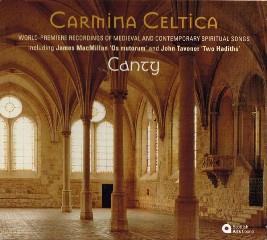Carmina Celtica (2010)
Carmina Celtica (2010)

01. Salve splendor (00:01:03) 02. Os mutorum (00:04:29) 03. Confessor Dei (00:00:57) 04. O quam mirabilis (00:03:57) 05. Green grow the rushes (00:02:33) 06. Lorica (00:05:21) 07. Flower Garland (00:03:53) 08. Five Lauds Antiphons (00:03:25) 09. Inviolata, integra et casta es, Maria (00:02:53) 10. Through the wood, laddie (00:04:23) 11. Shining Light (00:05:49) 12. Beatus Gallus (00:03:16) 13. There is nothing brighter than the sun (00:02:25) 14. A solis occasu (00:02:40) 15. Ubi flumen praesulis (00:04:44) 16. Sacrosanctam Kentegernus (00:01:58) 17. The Stars in their Courses (00:03:43) 18. Two Hadiths (00:09:15) Harp – William Taylor Vocals – Anne Lewis, Joanne Wicks, Micaela Haslam, Rebecca Tavener Ensemble – Canty Director – Rebecca Tavener
It would be easy to conclude that this release by the Scots medieval ensemble Canty represented an attempt to milk the perenniallly successful sales lodes of sensuously sung plainchant and Celtic music, but that's not really what it's about. The Celtic element, largely in the manifestation of William Taylor's Celtic harp, flavors the whole, but it's not really the central point. Instead the program is based on a linkage of medieval and modern choral material. The medieval pieces, some of them monophonic and some polyphonic, come from a variety of Scottish sources. They're interspersed, generally alternating but sometimes in pairs, with contemporary pieces that expand on medieval sounds. The mood is generally contemplative and sweet, but the strength of this release lies in the variety of the program within these parameters: the contemporary composers, most of whom are Scottish, make different uses of the medieval models. You might find fault with several aspects of this recording if you were in the mood. John Tavener's Two Hadiths, which concludes the program, is both theologically (hadiths are sayings ascribed to Muhammad) and musically (with its extended vocal effects) a shift from the rest of the program, although it's a lovely example of Tavener's new ecumenical style in itself. And the sheer surface beauty of the sound tends to distract you from the musical detail a bit. But this will nonetheless be a satisfying album for a wide range of audiences, from the meditatively inclined to fans of Celtic roots to those interested in contemporary resonances of medieval musical ideas. ---James Manheim, AllMusic Review
download (mp3 @320 kbs):
yandex mediafire ulozto gett bayfiles








